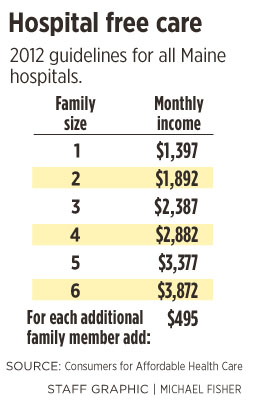Patients who may qualify for free medical care often don’t know how to get it or are too embarrassed to ask for it.
“As people become more aware of it, they are more willing to apply,” said John Gale, a research associate focused on hospitals, charity care and community benefits at the Muskie School of Public Service at the University of South Maine. “A certain amount of patients are reluctant to approach the issue of charity care because of pride.”
The Affordable Care Act requires hospitals to have written financial-assistance policies and an explanation of how charges are based. The rules also require hospitals to charge uninsured patients the same amount as they charge insurers, according to Jessica Curtis, hospital accountability project director for Community Catalyst in Boston, a national advocacy group.
“Hospitals are required to provide charity care and promote it widely,” Gale said. “What used to happen with some hospitals — it was on the books as a policy, but it was a question of how much the information was getting out.”
Every nonprofit Maine hospital is required to have a free-care policy that provides both in-patient and out-patient care to people with incomes up to 150 percent of the federal policy guidelines. For a family of four, the monthly salary cutoff is $2,882, according to Consumers for Affordable Health Care.
“People don’t understand that free care is even available,” said Joe Ditre, executive director of Consumers for Affordable Health Care. “There’s also a misunderstanding about what qualifies for free care. It’s a real conundrum. When someone receives services for a broken ankle in the hospital, they get a radiologist bill for the X-ray that is not covered as free care.”
Maine hospitals said they are making greater efforts to get free-care and insurance-aid information in the hands of patients.
Southern Maine Medical Center, for example, has a staffer who helps consumers determine if they qualify for government aid. The hospital also has been linking patients, who often had no previous health care services, with primary care physicians. As a result, the Biddeford hospital has seen a flattening in the use of its emergency room and an increase in the use of is primary care physician network.
A Falmouth woman who has been getting free care for 30 years at a Maine Medical Center clinic said the program works for her.
“Now there is a lot more free care available,” said the woman, who legally changed her name to “Terry.”
“They’re there if I need them. I feel I have better insurance than people with health insurance,” said Terry, who teaches violin and qualifies for free care. “Sometimes you have to do some finagling. Sometimes you get a bill. But you just call and say you’re part of the clinic.”
One crucial issue with free care is whether patients can request charity care at any point in their medical treatment, Gale said.
“It’s one thing to go into the hospital with what you think is pneumonia, and another to learn that it’s lung cancer and you’re now knee-deep in bills,” Gale said. “You have to look at how easy is it for patients to ask about charity care on their first encounter, and do they have the opportunity to raise the issue and revisit it at later times?”
Staff Writer Jessica Hall can be contacted at 791-6316 or at:
jhall@mainetoday.com
Send questions/comments to the editors.


